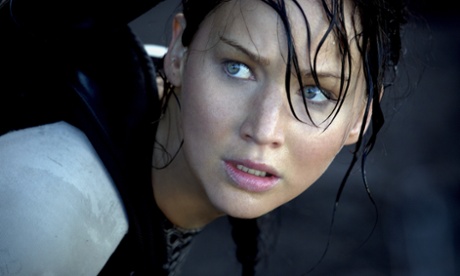
A page into The Hunger Games, Katniss Everdeen talks about love. She once tried to drown her sister’s cat in a bucket, but now she feeds him entrails from the prey she hunts, and he’s stopped hissing at her: “Entrails. No hissing. This is the closest we will ever come to love.”
Suzanne Collins’s 16-year-old heroine is hard as nails. And hard to like. She’s tough, hostile, calculating – and lethal. The trilogy is set in a dystopian future America where children are forced to kill each other on television to entertain the rich and powerful. When Katniss volunteers for the games in place of her sister, she knows nice people don’t win. But she doesn’t care about nice; she’d rather be brutal, and survive.
What a relief it was when The Hunger Games came out in 2008. For the previous five years, since Buffy the Vampire Slayer had ended in a blaze of female empowerment, the girl most YA readers seemed most interested in was Twilight’s mopey, whiny Bella Swan. Which was ironic because Bella herself was interested in nothing but her dreadful vampire boyfriend. Then came Katniss, Buffy’s heir. A fighter, a killer, a survivor, she fights boys, and even rescues boys. She hunts (like an Amazon, with a bow), she gathers, she climbs trees. She’s canny and resilient. She refuses to marry either of the gorgeous boys who love her; sweet, steady Peeta, who loves baking and painting, and rebellious, angry hunter Gale, who smells of woodsmoke. Basically, it’s Wuthering Heights, except that as while Katniss/Cathy is seesawing between Peeta/Edgar and Gale/Heathcliff, she also has to fight to the death, save her family and lead a revolution.
She’s so magnificent that at first I didn’t worry about how little she lets herself feel. I didn’t worry that she doesn’t want anything, apart from to survive. Or that when Peeta said he’d rather stay true to himself, she didn’t get it. I liked that she was emotionally unavailable (while the boys wore their hearts on their sleeves) because it was such a lovely reversal.
But then it started to bother me, the way she kept getting things (fabulous clothes, enduring love, political power) and throwing them away. Even the power. Especially the power. Which seemed a shame, as women have so little of it. And I worried about her heart; could she really be so cold?
It took me a while to work out my feelings about Katniss. Now I think she’s so tough because feelings are a luxury she can’t afford. She lives in a hardscrabble world where there isn’t time for anything but survival. She’s terrified of becoming like her mother, so poleaxed by grief that she can’t function. Then, in the games, it becomes expedient to pretend she’s in love with Peeta – expedient but deeply confusing. Just as she’s beginning to ask herself what she really feels, she is confronted with such horrors that she has to block everything out all over again. Collins’s exploration of post-traumatic stress is phenomenal (and, judging by the intense response, both resonant and needed). Katniss experiences nightmares, flashbacks and deep denial.
Which is why, after much seesawing of my own, I am Team Peeta not Team Gale. I’m glad Katniss ends up with someone who lets her be vulnerable, who comforts her. Oh and he can ice a cake, heft a sack of flour, and his kisses make Katniss feel a different kind of hunger to anything she’s felt before.
But this isn’t just a love story; it’s a harrowing, sophisticated political thriller. So Collins gives her heroine something new: Katniss doesn’t melt because of love. She melts because she sees injustice and it burns away at her until she decides to risk everything to bring down the system. And she does — and this is the best bit — not by fighting but by acting and speak from the heart.
I love Katniss Everdeen for dropping her guard. I love her for inspiring a revolution. I love her for seeing that the only way things change is through empathy; as she feels for other people, she realises that her feelings are not a weakness but a strength. They might even save her country. What better heroine could there be for our angry, confused and disconnected times?
Best of all, when Katniss eventually sheds her armour, she learns that there is more, much more, to love than entrails and an absence of hissing.
• Samantha Ellis is the author of How to be a Heroine. She will give a reading workshop on The Hunger Games on 16 August, and talk with Rebecca Mead on 17 August at the Edinburgh international book festival.

